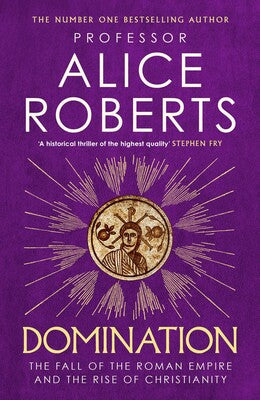1
/
of
1
Alice Roberts
Domination
Domination
Regular price
$36.99 AUD
Regular price
Sale price
$36.99 AUD
Taxes included.
Shipping calculated at checkout.
Quantity
Couldn't load pickup availability
This is the story of the fall of an Empire – and the rise of another.
LINDSAY'S REVIEW
Once again Alice Roberts takes a large chunk of history, deconstructs it, and re-forges it with an updated understanding. This time she delves into one of the least studied and less written about historical periods: that which is commonly referred to as the “Dark Ages.” It’s a fascinating period that covers the decline of the central state structure of the Roman Empire and the emergence of the feudal system. It also a period which offers few reliable sources, apart from myths, and mostly from the propagandistic writings of an early church intent on creating and substantiating their power. The book is well researched and highly readable, with Roberts’ typical blend of research carefully woven into a series of narratives.
The story begins, as we might expect, not with the state of the Roman Empire and the endless political battles from the second to the fifth centuries AD, but with the rise in Britain monastery dynasties bound closely with the growing feudal elite. Roberts recognises the cultural ties between the Celtic peoples of Britain and the Continent as they are re-ignited by the withdrawal of Roman control. However, she is less detailed in her exploration of the relationship between the early Church education structures and their similarity to the prior Druidic training grounds of Wales, as well as the Druidic mobile methodologies of education that included the mathematical, astronomical and natural sciences. But there is material to get through in this period. The endless list of Western European saints created by the early Church is an eye-opener in itself.
Furthering the understanding of the period, while wisely keeping away from too much analysis of the rampant political intrigues of the decaying Roman Empire, Roberts’ focus remains the growing cultural and political domination by the rapidly evolving Church structures. The ‘truth’ behind Constantine’s conversion is unresolved; rather, the book raises many questions about the beginning of the relationship between the State and the Church. The pogroms against the Christians is carefully questioned and reshapes the view of the persecutions, and the power of the victimhood status that reverberates with the present.
Touching on key moments in Christianity’s consolidation - the Council of Nicaea and Edict of Milan, amongst others - the book unfolds the complexity of the fusion between the rise of a new power and the decline of the old; one that attempts to shed light on the power structures forming during the “Dark Ages” and their continued and increasing role in the following Medieval period. It’s possible that our increasingly secularised Western culture society might overlook this book, while some readers may find the exposition of early Christianity does not strengthen their faith. But the book’s coverage of an interesting and rarely covered period in history is welcome, especially its perspective on the Church structures and how they formed and effected the survival and thriving of European nations. What is often forgotten, yet becomes so clear in Robert’s analysis, is that the Church never was, and still isn’t, a single entity with a unified doctrine. The play between the large and small needs of the both the Church and religion, the evolving decentralised State, and the whims central figures both inside and outside the religious orders shows a vibrant, diversified, and hotly contended evolving cosmology born of the darkest times. Domination is a worthwhile work of history, especially when read in conjunction with Roberts’ previous books The Celts, Crypt and Ancestors.
Beautiful hard back copies are still available at the Lane
PUBLISHER REVIEW
This is the story of the fall of an Empire – and the rise of another.
Who spread Christianity, how, and why? In her quest to find the answer, Professor Alice Roberts takes us on a gripping investigative journey. From a secluded valley in south Wales to the shores of Brittany; from the heart of the Roman Empire in a time of political turmoil to the ancient city of Corinth in the footsteps of the apostle Paul; from Alexandria in the fourth century to Constantinople.
As the Roman Empire crumbled in Western Europe, a shadow of power remained, almost perfectly mapping onto its disappearing territories. And then, it continued to spread. Unearthing the archaeological clues and challenging long-established histories, Professor Roberts tells a remarkable story about the relationship between the Roman Empire and Christianity.
Lifting the veil on secrets that have been hidden in plain sight, this story is nothing short of astonishing.
Domination is a page-turning exploration of power and its survival.
Share


